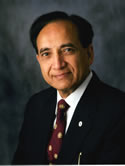Alteration of p53 pathway in squamous cell carcinoma of the head and neck: Impact on treatment outcome in patients treated with larynx preservation intent Journal Article
| Authors: | Osman, I.; Sherman, E.; Singh, B.; Venkatraman, E.; Zelefsky, M.; Bosl, G.; Scher, H.; Shah, J.; Shaha, A.; Kraus, D.; Cordon-Cardo, C.; Pfister, D. G. |
| Article Title: | Alteration of p53 pathway in squamous cell carcinoma of the head and neck: Impact on treatment outcome in patients treated with larynx preservation intent |
| Abstract: | Purpose: To identify the role of p53 pathway alteration(s) as predictors of treatment outcome in patients with advanced, resectable, squamous cell carcinoma (SCC) of the larynx and pharynx treated with larynx preservation (LP) intent. Patients and Methods: Seventy-one patients treated on two consecutive LP protocols were studied based on availability of representative tissues. We analyzed the expression pattern of p53, its upstream regulator mdm2, and downstream transcriptional target p21/WAF1 by immunohistochemistry. Positive phenotype was defined as ≥ 20% of tumor cells showing nuclear immunoreactivity. Results were correlated with treatment outcomes. Results: Positive phenotype was observed in 35 (49%) of 71 cases for p53, in 52 (74%) of 70 for mdm2, and in 37 (54%) of 68 for p21. There was no correlation between p53 phenotype and p21 nuclear accumulation. The mdm2-negative phenotype was most predictive of major response at the primary tumor site (P = .088). p53-positive phenotype was associated with worse local control with LP (LCLP; 49% v 23%, P = .053) and inferior overall survival (OS; 51% v 29%, P = .0 17) at 5 years. On Cox regression analysis, p53-positive phenotype predicted inferior OS (P = .033) and showed a trend for worse LCLP (P = .102). When analyzed in a multivariate model as continuous variables, p53 showed a stronger correlation with inferior OS (P < .01), and mdm2 was associated with worse OS (P < .01). Conclusion: Among the three markers studied, our data support p53 phenotype as the most informative predictor of unfavorable outcomes in the LP setting, and suggest a role for mdm2 phenotype that requires further exploration. Our analysis does not support a p53-dependent mechanism for p21 expression. Prospective and larger studies are necessary before integration of these molecular markers as part of molecular staging and predictors for organ preservation or other outcomes. © 2002 by American Society of Clinical Oncology. |
| Keywords: | immunohistochemistry; adult; cancer chemotherapy; controlled study; human tissue; treatment outcome; aged; aged, 80 and over; middle aged; survival analysis; cancer surgery; survival rate; retrospective studies; major clinical study; laryngectomy; larynx carcinoma; squamous cell carcinoma; carcinoma, squamous cell; laryngeal neoplasms; cisplatin; cancer radiotherapy; phenotype; apoptosis; proportional hazards models; tumor markers, biological; transcription, genetic; protein p53; prediction; gene expression regulation, neoplastic; head and neck neoplasms; predictive value of tests; tumor suppressor protein p53; organ preservation; immunophenotyping; multivariate analysis; cell nucleus; regression analysis; protein p21; head and neck carcinoma; protein mdm2; pharyngeal neoplasms; pharynx carcinoma; humans; prognosis; human; male; female; priority journal; article |
| Journal Title: | Journal of Clinical Oncology |
| Volume: | 20 |
| Issue: | 13 |
| ISSN: | 0732-183X |
| Publisher: | American Society of Clinical Oncology |
| Date Published: | 2002-07-01 |
| Start Page: | 2980 |
| End Page: | 2987 |
| Language: | English |
| DOI: | 10.1200/jco.2002.06.161 |
| PUBMED: | 12089228 |
| PROVIDER: | scopus |
| DOI/URL: | |
| Notes: | Export Date: 14 November 2014 -- Source: Scopus |
Altmetric
Citation Impact
BMJ Impact Analytics
MSK Authors
Related MSK Work













